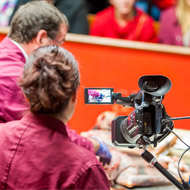
Procedure reveals insights about deceased cheetah
A one-off event offering a unique insight into the evolution of cat anatomy and movement has been held at the RVC in London.
Hosted in the Camden campus, the Wild Cats Uncovered event saw leading experts in feline anatomy perform a post-mortem on a cheetah before a live audience.
Attended by zoologists, vets, students and biologists, the procedure revealed insights about the individual animal, as well as the cat’s family.
“We shared a unique opportunity to celebrate the amazing form, function and evolution of cats in general, and the spectacular beauty of the cheetah specimen’s anatomy as well as its life and some clues about the sad story of its demise.
“We were flooded with challenging, insightful questions from the very enthusiastic audience and it was a joy to hear how much people attending appreciated the event. It was a very important event for us, considering out commitment to engaging the public with scientific research.”
Informally known as ‘Team Cat’, Professor Hutchinson led the post-mortem with Professor Anjali Goswami from University College London. Bringing together their expertise in biomechanics and evolutions, the researchers are working to better understand the evolution of form and movement within the cat family.
As most animal groups get bigger, their posture changes: their legs tend to straighten and become stiffer to support their weight. Yet cats do not. Despite their size ranging from 1kg to over 300kg, living members of the cat family are incredibly similar in their posture and how they stand or move.
Over the last three years, scientists from Team Cat have been investigating the evolutionary mystery of the “crouching tiger”.
Using a variety of techniques - from tempting tigers to cross 3D scales, to dissections, CT scans and measuring the remains of fossil cats - the researchers have been piecing together the developmental, ecological and biomechanical influences that have shaped the evolution of the cat’s musculoskeletal system.
“In evolutionary biology, we spend a lot of time trying to identify grand unifying processes or patterns that are repeated across different groups or different periods in Earth history, but the exceptions to these rules can sometimes tell us even more about how the current diversity of life evolved and why organisms look and behave the way they do,” explains Professor Goswami.
“It shouldn’t come as any surprise to a cat lover that cats are one of the weird groups that break the rules, and we are looking at this from numerous angles, from development to biomechanics, and using a wide range of analytical techniques to understand how they get away with it.”
The post-mortem on the cheetah, which died of natural causes, found abnormalities in the gallbladder, spleen, liver and lungs.
Together with its weight, the researchers say the abnormalities were consistent with the cheetah having died of a disease like cancer.
Image (C) RVC.



 The Veterinary Medicines Directorate (VMD) is inviting applications from veterinary students to attend a one-week extramural studies (EMS) placement in July 2026.
The Veterinary Medicines Directorate (VMD) is inviting applications from veterinary students to attend a one-week extramural studies (EMS) placement in July 2026.